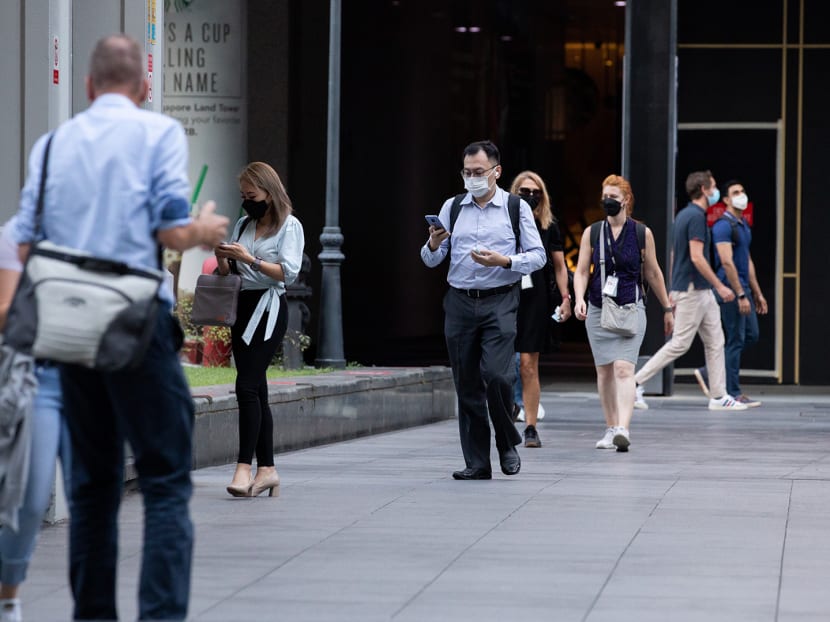Firms offering higher pay due to manpower crunch, thus driving up costs: SBF survey
SINGAPORE — The current manpower crunch, resulting from border restrictions to curb the spread of Covid-19, has been one of the biggest challenges businesses in Singapore have had to deal with this year.

- Rising manpower costs and the lack of skilled workers have been among the biggest challenges companies in Singapore are facing in 2021
- Businesses are also prioritising attracting and retaining workers by offering higher wages
- The Singapore Business Federation's CEO said some businesses may find this unsustainable
SINGAPORE — The current manpower crunch, resulting from border restrictions to curb the spread of Covid-19, has been one of the biggest challenges businesses in Singapore have had to deal with this year.
An annual survey by the Singapore Business Federation (SBF), which polled companies here on how the pandemic has affected their business this year and their outlook going forward, found that rising manpower costs and the lack of available manpower have emerged as some of the top challenges that companies face.
They also said that one of their top three priorities over the next 12 months was the need to retain or attract talent.
This was something that did not feature among the top three priorities in last year's survey.
Despite manpower challenges, the survey found that more companies are satisfied with the current business climate compared with last year, with more than half saying that they are no longer affected by the pandemic.
SBF's chief executive officer Lam Yi Young said in a media briefing on Wednesday (Dec 8) that companies have had to increase their wages to retain their workers or get others to jump ship, leading to higher manpower costs.
This is because border restrictions have made it hard for businesses to hire foreign workers who have been laid off last year when the economic impact of the pandemic was at its worst, leading to greater competition for a smaller pool of workers in Singapore.
"I think it's very much driven by overall shortage of skilled workers in particular sectors... Companies, on one hand, are worried about rising manpower costs, but they feel they have no choice but to pay more in order to get the people they need, which then leads to even higher manpower costs," Mr Lam said.
"That's why it's of greater concern to them. They see that if it keeps spiralling this way, it can become unsustainable for businesses."
The survey was done between July 26 and Oct 1 this year and polled close to 1,100 businesses.
The following are some of what the survey showed.
PRIORITIES AND CHALLENGES
Top business priorities in 2021:
- Growing revenue (49 per cent)
- Ensuring positive cashflow (38 per cent)
- Attracting or retaining talent (35 per cent)
Top business challenges in the past year:
- Manpower cost (48 per cent)
- Demand uncertainty (48 per cent)
- Travel restrictions (47 per cent)
- Availability of manpower (41 per cent)
MANPOWER CONCERNS
Manpower challenges that businesses said they faced:
- Rising manpower cost (62 per cent)
- Higher costs from new foreign manpower policies (50 per cent)
- Attracting or retaining younger workers (45 per cent)
- Strict foreign manpower policies that limit supply of foreign workers (44 per cent)
Hiring outlook:
- 35 per cent of companies are looking to increase hiring, compared with just 18 per cent last year
- Only 6 per cent are planning to cut their headcount, which is much lower than the 23 per cent last year
- 35 per cent are also planning to increase their employees' wages, higher than the 28 per cent with such plans last year
- 30 per cent are looking to invest in training staff members, as opposed to 19 per cent last year
Unsurprisingly, Mr Lam said that companies in essential services, which typically employ foreign workers in jobs shunned by Singaporeans — such as construction and waste management, as well as those in the technology and finance sectors looking for tech talents — face this crunch more acutely, though it is a concern that permeates across all sectors.
“They see that if it keeps spiralling this way, it can become unsustainable for businesses.Mr Lam Yi Young, chief executive officer of the Singapore Business Federation”
OTHER FINDINGS FROM THE SURVEY
Businesses are more satisfied with the current business climate:
- 25 per cent of companies felt that the business climate here has improved compared to the year before, higher than just 5 per cent last year
- 47 per cent are confident that the economy will improve in the next 12 months, compared with 31 per cent last year
- 87 per cent do not foresee the economy deteriorating in the coming year
Impact of Covid-19 on businesses:
- 56 per cent of companies said that Covid-19 had no impact on their business, compared to 31 per cent last year
- 12 per cent said that there was a positive impact, with average revenues going up by 25 per cent; last year only 6 per cent said that their business improved
- However, 32 per cent still reported a negative impact and have seen their average revenues dropped by 39 per cent. It is still better than last year, where 63 per cent of companies reported a negative impact
- Close to 70 per cent of companies negatively affected by Covid-19 believe that they will take between one and two years to fully recover











